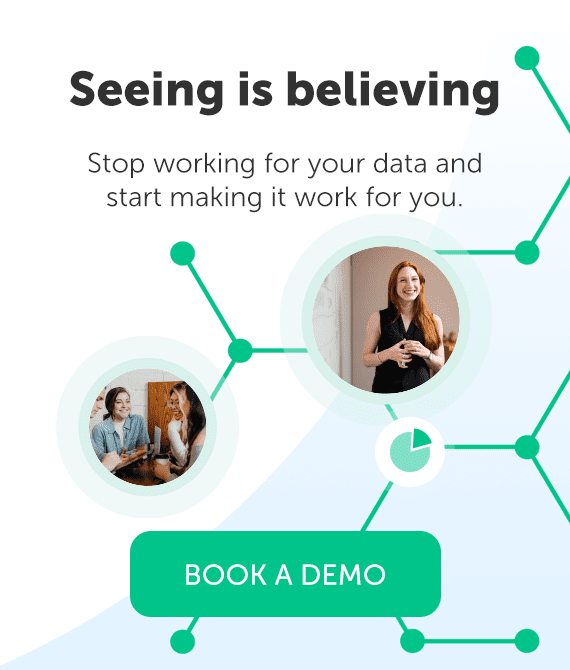Contact data doesn’t keep forever. In fact, businesses lose as much as 70 percent of their customer relationship management (CRM) records to “decay” each year. In layman’s terms, the contact info your sales and marketing team so diligently gathered is now out of date and useless.
Experts in the industry agree, including Fenwick & West’s Director of Marketing Technology, Jon Metcalf.
“The biggest hurdle to developing a useful, valuable CRM program is not the system,” he noted. “The biggest hurdle is how to get quality data into the system in the most efficient manner; not only at the beginning, but on an ongoing basis.”
Luckily, there’s a tried-and-true solution: proactive data maintenance. And it’s easier than you think. Keep rot out of your data and make sure your CRM works as hard as you do with these three steps.
3 ways to ward off data decay
- Fill in the blanks with automation
- Rely on AI for evergreen data
- Let relationship intelligence serve up contact insights—automatically
1. Fill in the blanks with automation
The fact is, CRM users’ top priority is—and should be—making the sale. Not mundane, time-sucking administrative work. Yet every call averages 7.5 minutes of note entry. That leads to corner cutting and dismaying statistics:
- 88 percent of CRM users enter incomplete contact information
- 62 percent don’t log all activities
- 69 percent of companies have outdated CRM data
- 63 percent of companies have duplicate contacts
Thanks to stats like these, 72 percent of executives say sales professionals don’t spend enough time in the CRM because they don’t see value in it. They’re not wrong. Sales pros cite their CRM tool as their biggest source of frustration. In fact, many are turning to spreadsheets to manage CRM-related tasks, a backward-facing trend that threatens to exacerbate data decay.
But what if you could fill in all the relationship blanks, accurately, without taking any extra time out of the day? You can—with contact data enrichment and CRM automation.
This automatic approach eliminates manual data entry, giving precious time back to CRM users. And it frees them from learning and navigating one more tool interface.
Best of all, the business benefits—and hopefully profits—from accurate, comprehensive customer and prospect lists.
Bonus: If your data enrichment tool offers relationship intelligence features, you can turn your now clean and robust relationship data into actionable insights. But we’ll get to that later.
2. Rely on AI for evergreen data
Customer data is always changing. Every hour, nearly 60 businesses change their addresses, more than 10 change their name, and 40 open their physical or virtual doors. At the same time, countless other prospects or customers go out of business. This is how CRM decay sets in—fast.
So how do you stay on top of all that change? If you don’t have the luxury of an internal, dedicated, quality control resource you might turn to a vendor to provide manual list scrubbing. But that can be slow and costly, with analysis often taking months and, worst of all, delivering largely obsolete information thanks to the bloated time table.
Enter your hero: artificial intelligence. Fast and cost-effective AI-powered data enrichment tools and email signature scraping technology.
These tools can be set to run on an ongoing basis, as well as called up to bat for massive data cleanses before adding new CRM contacts. From then on, tools like Introhive monitor contact data; flag inconsistencies, duplicates, inaccuracies, or incomplete records; and proactively suggest updates based on information extracted from a broad set of internal and external data sources, like emails, calendars and social networks.

3. Let relationship intelligence serve up contact insights—automatically
What if just before your next call your robot assistant (Johnny, we’ll call him), rolled up to your desk and gave you the low-down on everyone who would be on the line: how you know them, how well you know them, how they know the other people on the call, etc. etc. Armed with Johnny’s holistic view of relationship strengths, you and your team are prepped to make inroads with prospects and monitor customer relationships.
Sadly, Johnny doesn’t exist just yet. But, good news, powerful CRM data enrichment with relationship intelligence tech is already here. And it does deliver those pre-meeting reports—through email, though. (No robots included).
Instead of using your CRM as a contact database at best, or a hodge-podge dumping ground for client or prospect information at worst, relationship intelligence turns it into a high-performance customer insight engine.
For example, if the data shows you an individual with a strong connection to a prospect, you could tee up that person to provide a warm introduction or valuable intel on the company.
More generally, because it aggregates scores of all account connections, relationship intelligence will help you keep tabs on whether a relationship is trending positive or negative over time.
Use Automation to Enrich Your CRM Data and Sales Process
With nothing but good, clean data entered automatically into the CRM, salespeople are not only liberated from the burden of mundane data entry, but they can also focus on selling. And because they’re working with clean data, they can trust the relationship intelligence they glean from it to be valuable and true.
It’s not only salespeople who benefit, their leaders can rest easy knowing that their sales team is focused on selling. Plus, they can use the clean CRM data to analyze the success of the team’s sales activities, shaping future strategies.
Meanwhile, marketing professionals can be assured that their lists are accurate, their customer profiles are solid, and their leads are good. Customer service associates know that their records of contact are correct, enabling them to provide the highest quality of service.
Across the board, in every department, clean data produces the results everybody wants and makes possible the growth in revenue, relationships, and retention that come through Revenue Acceleration.
Next Steps
Bogged down by low-quality data, most CRMs are relegated to a small role in company strategy—or even day-to-day activities. But with automation and relationship intelligence, you eliminate manual data entry and surface deep relationship insights. Not only will you defeat data decay and user apathy, you’ll get the most value from your data, and CRM, as possible.
Turn your CRM into an insight engine with Introhive’s data enrichment services. Request a demo to learn more.





